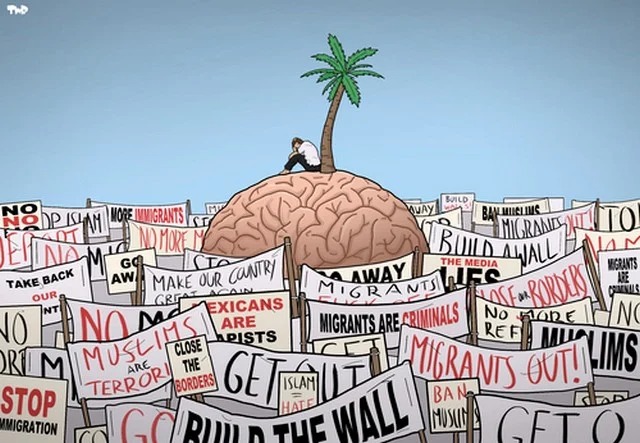The unity and diversity of populism
What do you think Donald Trump and Bernie Sanders have in common? Trump, who claimed that most of his country’s problems were due to migrants and Mexicans, and Sanders, who proposed a free universal health care system in the United States. It’s almost as strange for American culture as allowing, say, same-sex marriage in Armenia. The answer is known: both are populists, one is “right,” the other is “left.” Everything was clear to them: drive the Mexicans or treat all the people for free, and everything will be fine. Populism, then, is not an ideology; it is a way of presenting ideas, but it is not that there is no difference between ideas. If I had to choose between these two (and there was no other option), I would envisage the “left,” where there is at least a theoretical promise to solve social problems, unlike the “right,” which is ultimately based on the illusory idea of ”exclusivity” of one’s own nation or race.
Most of my readers who write comments usually ask the question in a populist way: “Why do you complicate everything? There are angels here, there are devils over there, the former must be encouraged, the latter must be destroyed, and everything will fall into place.” These readers are victims of populism, regardless of who influenced their opinion, the government or the opposition. But when people who present themselves as political scientists or experts make such judgments, it is a bit strange. It seems to me that no serious specialist in any field can present such a primitive picture of life, it is an unscientific approach. Politicians can, yes. And not only populists. Franklin Roosevelt once jokingly said, “I need one-handed economists.” In doing so, he expressed his dissatisfaction with the economists, who, presenting the country’s problems, said, “on the one hand… on the other hand.”
The scientist (I think also the journalist) should approach the issue from different angles. A politician is not usually required to do so. And especially for the populist everything is clear. “You are suffering, dear people, I am suffering like you, but you, proud citizen, are not guilty of it, I will show you where the culprits are, we will eradicate that evil together, after which we will live long and happy.”
Read also
For the “left” populists of the 20th and partly of the 21st century, the culprit was the “bourgeoisie,” and then the central theme became the environment. American and European populists have blamed various types of migrants, who, as the Russians say, “waltzed in.” British and a number of European populists are convincing their constituents that the center of evil is the European, Brussels bureaucracy, which deprives them of their national sovereignty. Putin, especially since 2011-12, has seen evil in the West with its alien values, as well as among Russian “non-patriotic” intellectuals who, unlike ordinary people, do not understand Russia’s unique mission and ambition to be a “Third Rome.” The Armenian populists have convinced a large part of our citizens that the whole problem is corruption, that’s why, in particular, that we could not resist the enemy during the war. (I wonder if there was no corruption in Ukraine. By the way, when the war is over, it will be interesting to analyze how corrupt officials have become defenders of the homeland).
Some generalizations can be made from all these examples.
- Populists do not focus on people’s thinking ability, but on the emotions that should unite their target audience. That’s why they are not interested in diversity of opinion and consensus, it is important that the majority think like them.
- These emotions must, in a broad sense, be directed against some “enemy.” As the German philosopher Carl Schmidt wrote, politics in general should be viewed as a special kind of social relationship based on the “friend-enemy” or “own-stranger” opposition. In the case of populism, this contradiction intensifies; you have to identify with the emotional unity of the leader and like-minded people through hatred of “strangers.”
- The populist leader always opposes the “elite” and the “ordinary” people, of which the leader is an integral part (I have recently had the opportunity to write about this). Moreover, the elite can include everyone: the middle bureaucracy, high-ranking officials, parliament, parties, civil society, etc. But the “most poisonous” part of the elite, according to populists, are the intellectuals. “We did not graduate from your universities,” said the Bolshevik commissars proudly. “The main enemy of our propaganda is the intellectuals,” wrote Dr. Goebbels.
- Populist parties usually choose one theme and build all their stories around it. It is a unique political expression of the “File Joke.” There is an evil – “corruption”, “migrants”, “bourgeoisie”, etc., and the rest is derivative. If that one issue is resolved, the remaining issues will be resolved automatically. Again, it is a manifestation of the desire to present everything in a primitive way. The whole pain is that populism is not so dangerous in developed countries. If the head of state (suppose Trump) is a populist, he still can not implement his crazy ideas, the system will not allow it, such programs will face many and multifaceted obstacles. This is not the case in failed states.
Aram Abrahamyan




























































